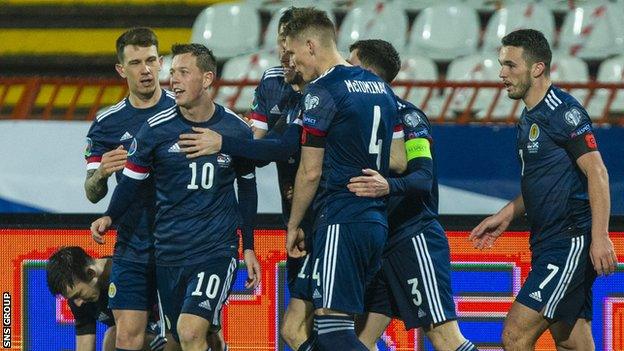Israel v Scotland: Why the final Nations League match matters
- Published

The Nations League could provide Scotland with a chance to reach another major finals
Nations League: Israel v Scotland |
|---|
Venue: Netanya Stadium, Netanya Date: Wednesday, 18 November Time:19:45 GMT |
Coverage: Listen to commentary on BBC Radio Scotland and follow live text updates on the BBC Sport website & app; watch highlights on Sportscene |
Scotland can clinch top spot in their Nations League group with a win against Israel on Wednesday - but does it really matter?
With qualification for Euro 2020 now secured and the pressure of a long tournament finals drought over, it is easy to dismiss the importance of the match in Netanya.
BBC Scotland explains exactly why it is a crucial match for head coach Steve Clarke and his squad.
Promotion means bigger games
If Scotland beat Israel, they will top Group B2 and earn promotion to League A for the next instalment of the Nations League.
That will mean games against bigger and better nations like France, Belgium or England. That not only gives Scotland the chance to get used to playing better sides but could be a game-changer for the Scottish FA's finances.
Big games mean big stars, which means - Covid-19 permitting- full houses at Hampden Park again, something that has not been a regular occurrence in the past five years.
SFA chief executive Ian Maxwell told BBC Scotland on Saturday: "A real transformational element of this will be if we can get Hampden full for the World Cup qualifiers next season, then the Nations League the next year.
"If we start to get sell-out crowds then all the money we get in as the Scottish FA goes back out through the clubs or grassroots game."
The governing body is considering redundancies to help with a £4.5m shortfall due to the Covid-19 pandemic. Promotion for Scotland would not necessarily change that, but it could help spark a domino effect for the national game's finances.
A second chance at the World Cup
Winning the section could give Scotland a second shot, should they need it, to qualify for the World Cup in Qatar in 2022. The guaranteed way to get there is to win their qualifying group, which will be drawn later this year, with matches to begin in March 2021 and end 12 months later.
Teams will be split into 10 groups of five or six and the group winners will reach the World Cup, with the 10 runners-up entering the play-offs. Scotland will be in pot three of that draw, which means they will end up in a group with two strong sides. Put simply, it will be tricky to finish in the top two.
That's why topping this Nations League group is so vital. The two best Nations League group winners who don't go on to automatically qualify, or reach the play-offs via the normal route, will enter the play-offs anyway to make the numbers up from 10 to 12.
Those 12 teams will be drawn into three different play-off paths. There will then be two semi-finals and a final in each path, with the three winners making the World Cup.
Basically, because most of the teams above them will be likely to secure their place in the traditional way, Scotland are likely to be two games from the World Cup if they beat Israel on Wednesday.
Building momentum
If you haven't woken up to the benefits of the Nations League yet then here's another one for you - it's a chance to keep building momentum.
Scotland were nine games unbeaten before Sunday's 1-0 defeat in Slovakia and another loss on Wednesday would be a minor set-back given how strong a position the squad put themselves in to win the group.
Of course, slipping up won't take any of the shine off last week's dramatic night in Belgrade, but the reason Scotland got themselves to the Euros was by quietly building belief through results.
Another successful Nations League campaign will help Clarke and his squad strengthen that confidence heading into World Cup qualifiers in March and then play at next summer's finals in the best frame of mind.